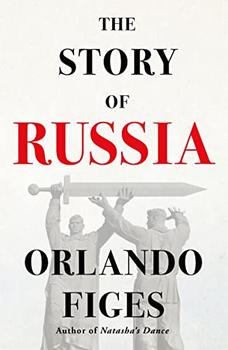Page 1 of 1
There are currently 2 reader reviews for The Story of Russia
Write your own review!
 Anthony Conty
So Much I Didn't Know
Anthony Conty
So Much I Didn't Know
“The Story of Russia” by Orlando Figes has a wealth of information about Russian history and recognizes that it is more complex than most realize; for example, the book contains a lot of maps, and you will need them to describe the provinces at different points throughout history. But, as is the case with historical summaries like this, the author can either err on the side of being too accessible for history buffs or too detailed for the casual reader: Figes chooses the latter, and you will learn something.
I am reasonably well-informed, but the 1500s are not my strong suit. Nevertheless, hearing about a period in which leaders and the clergy worked in unison, and tsars quoted the bible to rationalize their crimes was sobering.
The sheer volume of religious conflicts and wars was shocking. In the 1600s, when the West began to acknowledge that Russia had power, many deaths occurred, leaving citizens to know nothing but that life.
Russia had the unique position of affecting European and Asian life. As they attempted to expand materialistically, they embraced foreigners but banished Jews in the late 1700s, possibly changing the sentiments of Europe. When culture and religious wars heat up in the 1850s, Figes achieves the tricky balance of respecting the Russian viewpoint while still painting a picture of revolution and violence.
If I were to judge public sentimentality by my social media feed, people are fascinated by the philosophy of Marxism but hate Communism. But, of course, you can do both and remain fascinated by the events that led to Lenin’s ascent to power. I had no idea that so many different groups opposed each other in the time of World War I and the Russian Revolution. Their methods of propaganda do not differ much from today’s.
My biggest weakness when posting these on social media is obsessing over what my conservative and liberal friends will think. Fear not. Figes views Communism as a fast-rising phenomenon and goes into great detail as to how it failed. I am amazed by how much I did not know about Lenin and Stalin. If anything, it created empathy in me for the Russian people, as so many lived under poor leadership without any knowledge or capacity to fix it.
Sandeep Yadav
The Story of Russia by Orlando Figes review – Vladimir Putin and the power of myth-making
Every nation has its founding myths and narratives, usually starring historical figures we know almost nothing about; absurd stories even to the schoolchildren to whom they are usually peddled. Think Alfred and the cakes or Robert the Bruce and his study of spiders. For Russia, it has long been Grand Prince Vladimir, who had 800 concubines and wives before choosing Christ over Muhammad at the end of the first millennium for the very Russian reason that Islam did not permit alcohol. In truth, Vladimir (or Volodymyr to the Ukrainians) is a classic founding figure, now a saint, about whom almost nothing is known. Yet according to President Putin, unveiling a monstrous statue to him in 2016, he “gathered and defended Russia’s lands… by founding a strong, united and centralised state”.
